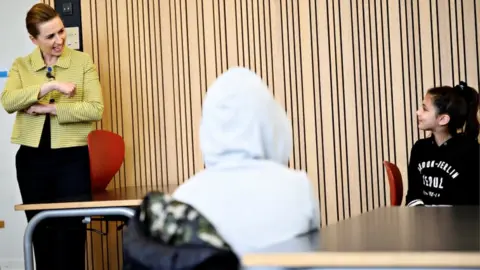Coronavirus: Denmark lets young children return to school
 Reuters
ReutersChildren up to the age of 11 are returning to nurseries and schools across Denmark, as the government becomes the first in Europe to relax coronavirus restrictions on education.
Prime Minister Mette Frederiksen welcomed children as they went back to school in the capital Copenhagen.
Denmark was among the first countries in Europe to impose a lockdown, with schools closed on 12 March.
Infection rates have been low but critics warn the strategy is risky.
"We're all a bit nervous and we'll have to ensure that we stick to hygiene rules," Elisa Rimpler of the BUPL, the Danish Union of Early Childhood and Youth Educators, told the BBC.
"We have a lot of washing hands during the day. We don't have masks and we have to keep a good distance from each other so that's a very difficult task."
Denmark's move came as European Commission chief Ursula von der Leyen set out a roadmap on Wednesday for a gradual lifting of restrictions across the 27-state bloc, but made clear it was not a signal to act immediately.
She set out key conditions involving a significant decrease in the spread of Covid-19, capacity in the health system, surveillance and monitoring. A donors' conference will take place online for governments and organisations to pledge money in search of a vaccine, Mrs von der Leyen added.
 AFP
AFPOther countries besides Denmark have moved to relax lockdown measures this week:
- Austria reopened thousands of smaller shops on Tuesday and has said it will allow outdoor sport such as tennis, golf and athletics from 1 May
- The Czech government has set out a five-stage timetable
- Spain has allowed non-essential workers to go back to work after a two-week pause
- Italian bookshops and clothing stores for youngsters have reopened their doors in some regions
German Chancellor Angela Merkel will discuss easing restrictions with the country's 16 state premiers on Wednesday, with reports that they are expected to agree to a limited reopening of shops from next Monday and a relaxation of rules on movement from 3 May.
Spain reported another 523 deaths on Wednesday and a 3% increase in infections but officials said the rise in new cases may have been due to a delay in reporting because of the Easter break.
In Russia, veterans' groups have appealed to President Vladimir Putin to cancel the 9 May military victory parade marking the 75th anniversary of the end of World War Two. Kremlin officials have indicated the event could be held at a later date.
What has Denmark done?
Denmark has so far reported 299 deaths and 6,681 positive cases, although many more are thought to be infected.
It has been widely praised for its swift action in restricting movement before Covid-19 infections were able to spread across the population - leading it to be compared to South Korea.
The head of the SSI infectious diseases institute said Denmark had managed to reduce the number of other people that one positive case infects from 2.6 people before the 12 March lockdown, to 0.6.
Tyra Grove Krause told Danish TV that the success had proved how social distancing, hygiene and other measures such as working from home could work.
The prime minister has said so much progress has been made that she is discussing with political partners how to push forward with a further easing of the restrictions.
On a visit to a school in the Valby area of the capital, Ms Frederiksen said she understood that some parents still preferred to keep their children at home.
Some political figures have expressed concerns that guidelines setting out who should go back to school are unclear. The schools themselves will decide whether staff in an at-risk category should be at work or remain at home.
One parent told the BBC that schools in her area were not going to open until Monday. She added that there was concern that authorities would try to enforce the return to school on children of families who had people at high risk from the virus living at home.
What is happening in Germany?
Angela Merkel held talks with cabinet ministers on Wednesday before discussing an easing of measures with Germany's 16 states.
According to reports in German media, shops of up to 800 sq m (8,600 sq ft) will be allowed to reopen from 20 April subject to strict conditions on the number of customers allowed in at a time. Car dealers and bookshops would be allowed to open regardless of size, as well as zoos, libraries and botanical gardens.
Other larger stores would then be allowed to reopen from 4 May along with hairdressers but religious services would still be barred, and bars and restaurants would remain closed.
Curbs on people's movement are likely to remain in place up until 3 May and steps will be taken to restart education, with the focus on classes preparing for exams.
North Rhine-Westphalia, Germany's most populous state, is already planning to reopen primary schools from the start of next week. Bavaria's state premier, Markus Söder, believes that is too soon.
Germany's RKI public health institute has said the number of deaths from coronavirus has risen by another 285 in the past 24 hours to 3,254, which is relatively low for a population of 83 million. It now has 127,584 positive cases.
The economy ministry said Germany fell into recession last month and is unlikely to come out of it before mid-2020.

- A SIMPLE GUIDE: How do I protect myself?
- AVOIDING CONTACT: The rules on self-isolation and exercise
- HOPE AND LOSS: Your coronavirus stories
- VIDEO: The 20-second hand wash
- STRESS: How to look after your mental health

